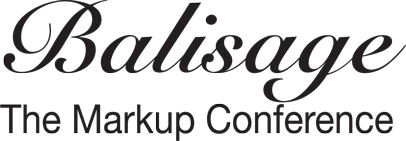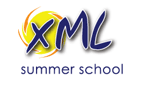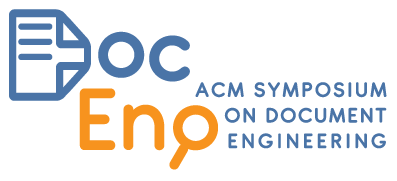Schedule for Thursday
| Time | Room RB209 | Room RB210 | Room RB211 |
| 9:00–10:00 | Registration | ||
| 10:00–11:30 | oXygen Users Meetup | DBpedia meetup | XSL-FO, CSS and Paged Output – hosted by Antenna House |
| 11:30–12:00 | Coffee break | ||
| 12:00–13:30 | oXygen Users Meetup | DBpedia meetup | Introduction to CSS for Paged Media |
| 13:30–15:00 | Lunch break | ||
| 15:00–16:30 | oXygen Users Meetup | Introduction to FusionDB | Schematron Users Meetup |
| 16:30–17:00 | Coffee break | ||
| 17:00–18:30 | oXygen Users Meetup | XProc 3.0 live | Creating beautiful documents with the speedata Publisher |
How unconference day will be organized
In both morning and afternoon there will be two 1.5 hour long slots separated by coffee break. Sessions will be running in three parallel rooms. Lunch will be provided for attendees with a full-pass.
Program of respective sessions is completely in hands of session organizer. So any queries about particular session should be directed to the session organizer.
Location
The first conference day takes place in the same venue as the main conference. However it is situated in the different building. It is best to use campus entry from the Italská street. You can see entrance and explore area using Google Streetview.
Just use entrance from Italská street and continue straight inside building until you reach atrium. Then use stairs to go one floor up and then look around for room RB209, RB210 or RB211 (alternatively you can use elevators on the left side and go to the floor marked as 2 on the control panel).
Session details
oXygen Users Meetup
organized by George Bina
The oXygen users meetup is a great opportunity to meet oXygen developers as well as other oXygen users. The various sessions we host cover both how oXygen supports you for XML development and XML authoring, presented by our developers and we always try to also invite some of our users to share their experience.
» See more detailed schedule
DBpedia meetup
organized by Milan Dojchinovski, Julia Holze and Sebastian Hellmann
The DBpedia meetup is a great opportunity to meet DBpedia Community as well as the core DBpedia dev team, DBpedia developers and users. It will feature a discussions about Open Data, Linked Data Technologies and the most recent technological advancements around DBpedia (i.e. DBpedia databus and the new release circle).
» See more detailed schedule
Schematron Users Meetup
organized by Tony Graham and Andrew Sales
Schematron is a language for making assertions about the presence or absence of patterns in XML documents. It is widely used as an adjunct or an alternative to grammar-based validation of XML documents using a DTD, W3C XML Schema, or RELAX NG.
If you don’t know Schematron, this session will give you the introduction that you need to understand why other people are using it and why it features in conference presentations. If you already know Schematron, this session will bring you up to date with the current state of the Schematron standard and software as well as show you ways that other people are using Schematron, possibly ways that you haven’t thought of yet.
XSL-FO, CSS and Paged Output hosted by Antenna House
organized by Michael Miller and Tony Graham
The intent of the Antenna House Unconference session will be to again share developments and experiences producing paged media and to discuss topics of interest.
Producing formatted pages is still important to many of us. In this 90-minute Unconference Day session, we’ll provide a brief update on Antenna House activities and then open the session up for you to share your interesting challenges and solutions for producing paged media output using XSL-FO or CSS.
This also is an opportunity to brainstorm with the assembled or try to stump our resident expert with a real-life problem you are facing and are trying to solve.
If you have an interesting example to share, please get in touch with Michael Miller.
We want this session to address what you are interested in. Give us your comments!
Introduction to CSS for Paged Media
organized by Tony Graham
CSS can be used for making pages as well as for styling websites. In fact, the beginning of every CSS specification includes:
CSS is a language for describing the rendering of structured documents (such as HTML and XML)
on screen, on paper, in speech, etc.
Many people are familiar with CSS in the browser: some are very familiar, but others, not so much. Fewer people, however, are as familiar with using CSS for paged media.
This tutorial takes an eat-your-own-dog-food approach to showing how to use CSS for paged media. Using the HTML text of its own slides, the tutorial session will progressively reveal and explain the CSS styles that are used to format and paginate the slides. By the end of the session, the fairly undifferentiated mass of text will be formatted with running headers and footers, page numbers and page number cross-references, bleeds, CMYK colours, footnotes, top- and bottom-floats, and other features that appear in paged media but not in a browser.
The session will also describe accessibility features of PDF and include a demonstration of a screen reader recognizing lists in the PDF and avoiding reading the headers and footers on each page.
XProc 3.0 live
organized by Achim Berndzen, Gerrit Imsieke, Erik Siegel and Norman Walsh
XProc 3.0 brings many improvements to XML pipeline processing, e.g.:
- In addition to XML documents, now text documents, JSON documents, and binary documents can flow between the steps of your pipelines.
- Variables and options are now typed, XPath 3.1 is used as expression language, maps and arrays can be used in your pipelines.
- Many syntactic short cuts allow you to write much shorter pipelines.
The editors of the XProc 3.0 specification will give you an overview over XProc 3.0 and discuss example pipelines demonstrating the basic improvements. Additionally two implementations will be shown for the first time.
While the core specification of XProc 3.0 is now almost finished, the specification of the step library is still work in progress. In this part of the session, the editors are looking for your advice on which step types you would like to see in the standard library.
Please join us for this session of XML Prague’s unconference day to discuss the latest news about XProc 3.0.
Introduction to FusionDB
organized by Adam Retter
An unconference session where we hope to demo some parts of FusionDB.
Creating documents with the speedata Publisher
organized by Patrick Gundlach
In this sessions you will see how to use the speedata Publisher. Patrick will show examples, explain how to go create simple and more advanced documents, answer questions etc. The speedata Publisher is an open source database Publishing software that creates PDF from XML data. It is helpful to have an speedata Publisher and XML editor installed.












